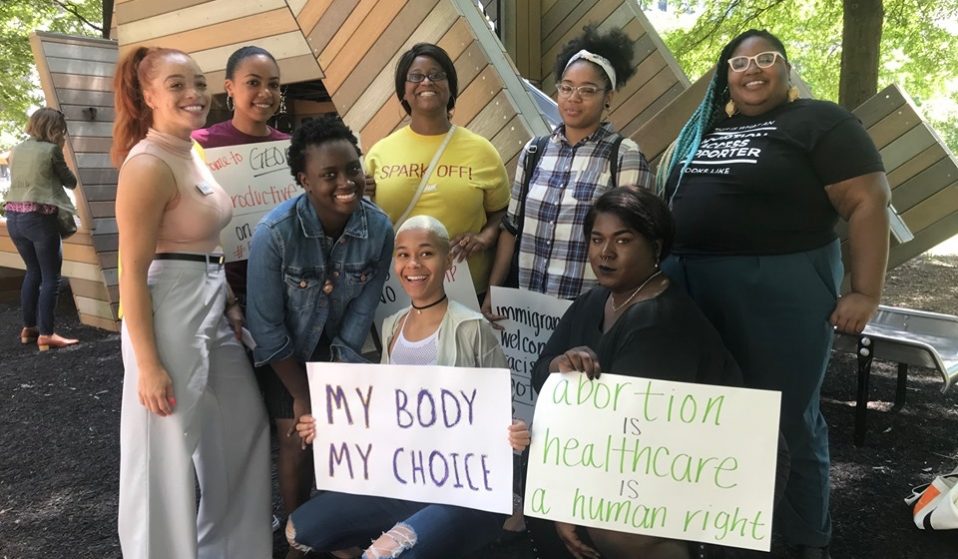Preying on the Pregnant
Georgia is funding anti-abortion centers that pose as clinics and put pregnant people at risk. SPARK Reproductive Justice Now
SPARK Reproductive Justice Now
Reproductive justice organizers in Georgia are waging a battle on two fronts: Not only are they contending with the state’s six-week abortion ban, but they’re also fighting to defund anti-abortion centers, which are otherwise referred to as crisis pregnancy centers (CPCs). These typically religiously affiliated nonprofits are known for offering non-evidence-based services such as “abortion pill reversal” to people seeking medical care.
The Atlanta-based Spark Reproductive Justice Now, a Black LGBTQIA+ and women-led organization, has been advocating to end the Positive Alternatives for Pregnancy and Parenting Grant Program, the state mechanism that funds anti-abortion centers, since its inception. Spark’s policy and advocacy director, Agbo Ikor, anticipates the state will provide even more resources and support to these fake clinics in the wake of the six-week abortion ban and the U.S. Supreme Court overturning Roe v. Wade.
Since Republican state legislators voted to fund anti-abortion centers in 2016, nearly a quarter of the state’s 89 CPCs have collectively received $10.3 million via taxpayer-funded grants. This past year alone, the state distributed a total of $1.8 million to 13 of these centers through the Positive Alternatives program.
According to advocates, the main purpose of anti-abortion centers is to coerce pregnant people, especially those with unintended pregnancies, into not having abortions rather than providing them with comprehensive, fact-based reproductive care. And because they can be mistaken for actual abortion clinics, the state’s support of their activities puts pregnant people at even greater risk.
At Spark, Ikor made “secret shopper” calls to anti-abortion centers to learn what they say firsthand. Ikor said these centers attract people by advertising free services such as pregnancy tests and ultrasounds. For those who are unfamiliar with anti-abortion center tactics and their facilities, they can fall prey to more serious privacy issues and aren’t aware that the centers aren’t usually medically licensed and therefore aren’t bound to ethical and medical standards, nor to laws protecting personal health information. And according to an investigation by Reveal and The Markup, 294 anti-abortion centers shared sensitive visitor data shared with Facebook.
“To have an organization who positions themselves as providers of medical care essentially mislead folks can be very dangerous and harmful to people who are just looking for care,” Ikor said.
According to Akayla Galloway, founder of the Social Justice Center who works on reproductive justice policy and advocacy in the Southeast, Georgia’s six-week abortion ban could increase fake clinics’ surveillance of pregnant people and their pregnancy outcomes, as well as their interference with people’s ability to access abortion care. As of 2017, there are three times as many anti-abortion centers as facilities providing abortion in Georgia.
“We know from their tactics before the six-week ban went into effect they will lie to you and tell you that you’re too far along to obtain an abortion,” said Galloway, who most recently worked in Atlanta.
Galloway cited a study on anti-abortion centers she finds alarming given her experience in HIV advocacy, education, and prevention: nearly a third of Georgia’s fake clinics with sexually transmitted infection (STI) testing services don’t offer treatment, only 13.8% test for HIV, and none of the centers lacking HIV testing provided a referral to somewhere that could administer the service.
Advocates and researchers are adamant that anti-abortion centers are gaining substantial traction nationwide in the current political landscape
The study’s lead author, University of Georgia epidemiology and biostatistics associate professor Andrea Swartzendruber, told Prism about a trend in Georgia where anti-abortion centers position themselves as more medicalized by offering services like STI testing and adding terms like “health,” “health care,” and “clinic” to their names. According to Swartzendruber, many anti-abortion centers actively use search optimization strategies to make sure they appear high on the first page of Google search results. Centers may also appear among the first Google results passively.
“One of the main dangers is that people looking for safe, quality health care may end up at a CPC with misconceptions about what the center is, does, and does not do,” Swartzendruber said. “This could lead to delayed and missed opportunities for health care.”
Some fake clinics are even offering sports physicals, like PRC Medical in Douglasville, Georgia, which provides the service to “middle school girls (who have started menstruating), high school girls, and college-aged women”—prime targets for their anti-abortion, anti-contraception agenda.
Swartzendruber has also noticed an increase in funding for the centers in other states where legislators are campaigning to ban or severely restrict abortion. For example, Texas approved $100 million on “alternatives to abortion” over the next two years while passing some of the most restrictive abortion laws in the nation—a 25% increase from the previous legislative session. Most of the funds went to the state’s nearly 200 anti-abortion centers.
In contrast, a number of states are actively working to defund Planned Parenthood, which would mean excluding the reproductive care organization from being reimbursed for prevention or health care services rendered to people insured by Medicaid or who qualify for free or low-cost health services.
Swartzendruber said state funding allows anti-abortion centers to advertise and promote their activities, provide transportation assistance to clients, and buy new equipment.
In addition to funding fake clinics, the Georgia state legislature passed a law earlier this year enabling them to open “maternity supportive housing residences” (MSHRs) for new mothers that are less regulated than traditional maternity homes. Although reproductive justice organizers aren’t yet sure how this new law—one of the first of its kind in the country—will impact Georgians, they’re concerned because it prevents local governments from overseeing MSHRs in the same way they oversee other community residences.
Allison Coffman, executive director of Amplify Georgia Collaborative, a convenor of Georgia reproductive health, rights, and justice organizations, pointed out that their concerns have a historical basis. Maternity houses have been used to separate unwed pregnant people from the support of their families and communities so they’d be more susceptible to pressure to give birth and put their children up for adoption.
“Given this history and the fact that the same groups running anti-abortion centers are also creating MSHRs, it is alarming that the Georgia legislature has decided to carve out an exemption for these homes,” Coffman said.
Advocates and researchers are adamant that anti-abortion centers are gaining substantial traction nationwide in the current political landscape and pose a considerable risk to pregnant people, especially those vulnerable to misinformation, lacking community and family support, and in desperate need of honest medical advice and help.
“I expect no matter where centers are across the country, whether abortion is banned, severely restricted, or remains protected, CPCs will grow in prominence in one way or another,” Swartzendruber said.
Despite the onslaught of attacks against abortion justice in Georgia, advocates aren’t budging with their demands for the state to defund anti-abortion centers. One of the loudest advocates for defunding Georgia’s fake clinics is state Rep. Renitta Shannon, a Democrat who first introduced a bill to repeal the Positive Alternatives program in 2019 and then again in 2021.
Shannon said she doesn’t understand why Georgia is spending millions on a religious pet project when the state is currently plagued by health crises, such as the highest maternal mortality rate, one of the highest uninsured rates in the nation, and rapidly increasing rural and metro hospital closures.
“If these crisis pregnancy centers are using private money to exist, then that’s their business, just as any church or other religious entity has the right to exist,” Shannon said. “But when you’re asking the state to fund these centers, that’s where the state has no business getting involved, just as the state should not fund churches.”
Neither of Shannon’s bills received a hearing in the majority-Republican state legislature, and she will no longer be in office come January. Her colleague who co-sponsored the previous bills, Rep. Park Cannon, plans to sponsor the repeal bill next legislative session.
“We need to trust doctors over volunteers posing as doctors,” Cannon told Prism.
According to Shannon, another pathway to defunding fake clinics is for legislators who oppose the Positive Alternative program to negotiate with their colleagues for its removal from the state budget at the beginning of the legislative session when budget talks occur. However, given the current intensity of anti-abortion legislators, the pathway to any sort of acceptable agreement is considerably fraught.
Ultimately, what’s at stake is the ability of pregnant people to make informed choices and receive the care they need without having to wade through the sea of misinformation, fear-mongering, and manipulation
In the meantime, Amplify is considering crafting “truth in advertising” legislation that would prohibit fake clinics from misleading pregnant people with their advertising. Regulation on both state and local levels could make it harder for anti-abortion centers to employ the deceptive advertising practices they currently rely on. Coffman said that the existing patchwork of laws and regulations regarding truth in advertising could be bolstered to prevent anti-abortion centers from falsely claiming they provide services to entice pregnant people to contact them.
“One of the Atlanta Reproductive Justice Commission’s recommendations to the city of Atlanta is to consider passing an ordinance that would prevent these lies in advertisements,” Coffman said.
Georgia advocates aren’t the only ones demanding more public transparency from anti-abortion centers. Calls to end anti-abortion centers’ lies are happening across the country. The Connecticut General Assembly passed a bill in 2021 to require truth in advertising from anti-abortion centers, and a group of U.S. senators recently introduced the Stop Anti-Abortion Disinformation Act to crack down on these centers’ false advertising.
Additionally, Yelp began labeling anti-abortion centers to distinguish them from actual medical facilities this year due to pressure from organizers, and members of the Alphabet Workers Union at Google are petitioning their employer to remove results for anti-abortion centers from their search engine.
As the anti-abortion movement grows, so does the public’s knowledge of these centers. That public awareness is even more critical as anti-abortion centers continue to expand their influence by peddling misinformation about reproductive health. Some anti-abortion centers even provide non-evidence-based abstinence-only sexual education in public schools, including in Georgia.
Galloway said Georgians can express their opposition to the state’s funding of anti-abortion centers by calling them what they really are—fake clinics—among other actions, such as demanding the state government only endorse programs and organizations providing comprehensive and fact-based care utilizing the full range of reproductive options.
“We can also educate each other on what fake clinics are, how to stop them, and the risks they pose to us, especially young folks, low-income folks, and people who may not have a primary care provider who are just looking to get short-term answers to determine if they are, in fact, pregnant,” Galloway said.
Shannon agreed that now is the perfect time for Georgians to demand action from their lawmakers to fund actual health care and reproductive services, especially as hospitals in the state close left and right.
“The issue of Republicans being so hellbent on making sure people don’t have access to abortion is hurting people who can’t even become pregnant because that money is not going to community hospitals,” she said. “When a community hospital closes within your area, you have to travel that much farther to get access to care if you have a life-threatening emergency.”
Ultimately, what’s at stake is the ability of pregnant people to make informed choices and receive the care they need without having to wade through the sea of misinformation, fear-mongering, and manipulation anti-abortion centers both perpetuate and depend on. Spark wants to see Georgia put money for pregnancy services in the hands of pregnant people themselves.
“[Pregnant people are] the ones who can dictate the most what they need, so our main priority will always be to get money into their hands directly,” Ikor said.
Your support matters…Independent journalism is under threat and overshadowed by heavily funded mainstream media.
You can help level the playing field. Become a member.
Your tax-deductible contribution keeps us digging beneath the headlines to give you thought-provoking, investigative reporting and analysis that unearths what's really happening- without compromise.
Give today to support our courageous, independent journalists.






You need to be a supporter to comment.
There are currently no responses to this article.
Be the first to respond.